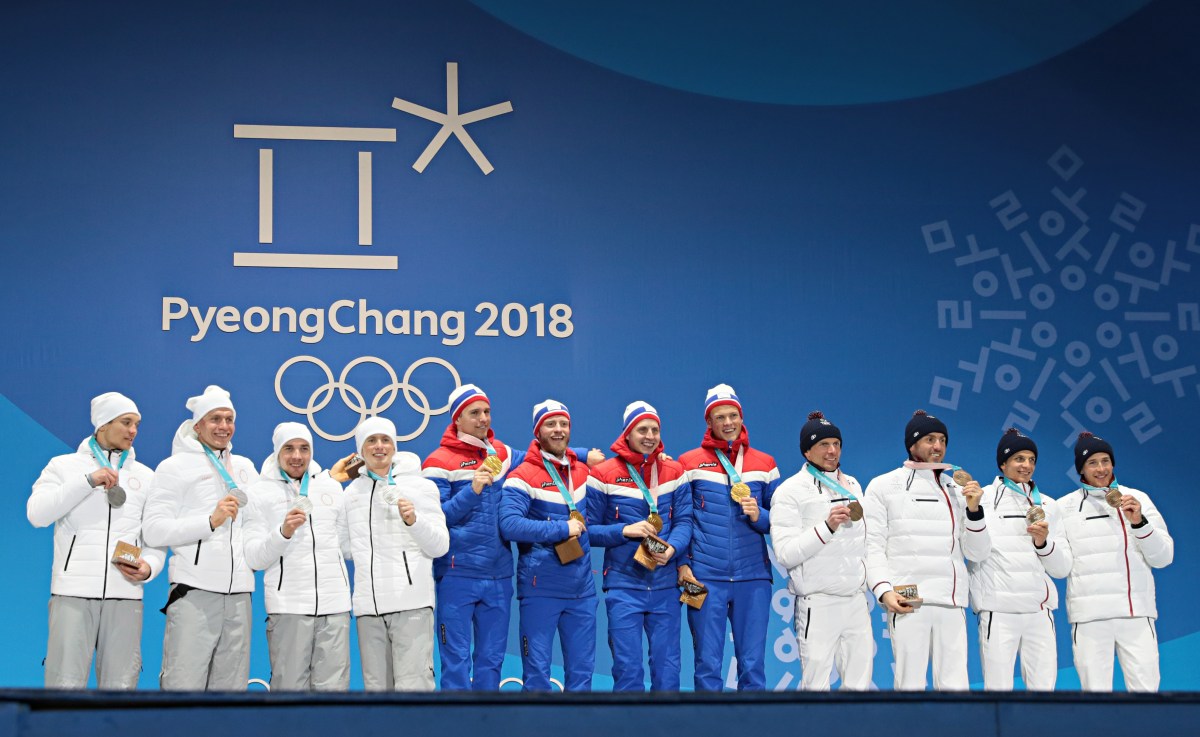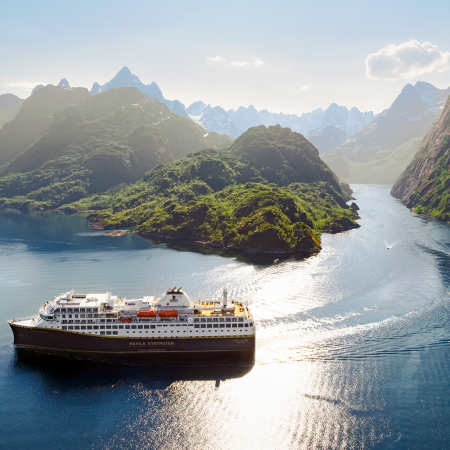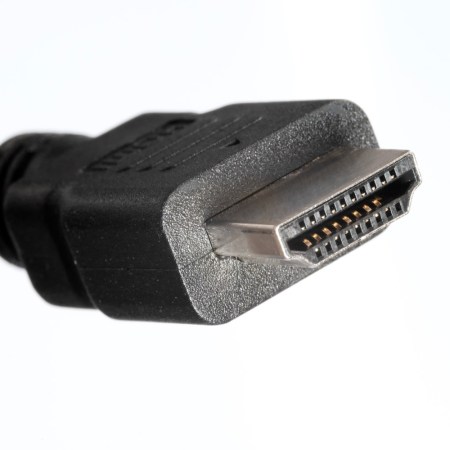Everyone knows Nazi Germany hosted the 1936 Summer Olympics. What’s less remembered is that they hosted the 1936 Winter Olympics too. Frustrated as he might have been by Jesse Owens’ gold medals, Adolf Hitler had to be pleased on the whole by his nation’s summer showing. (In 1932, they finished fourth in total medals as they earned 83 fewer than the U.S.—in 1936, they finished first in golds, silvers and bronzes, besting America by 33.)
Maybe it was enough to make him forget that earlier in the year, Deutschland had been humbled by the Norwegians. At the Winter Olympics, Norway’s seven golds topped Germany’s total medal haul.
Understand: The Germans are in good company. When you go to the Winter Olympics, Norway invariably embarrasses everyone. Norway won the most medals in 1924, 1928, 1936, 1948 (tied with Sweden and Switzerland), 1952, 1968, 1994 and is poised to come out on top this year as well. This has been accomplished a population of just over five million—118th in the world and smaller than Minnesota.
Norway has thrived not only against much larger nations, but against much larger nations that were aggressively cheating. (See the former Soviet Union and modern Russia. )
How? Here are some of the key reasons, as explained with the help of proud Norwegian-American Nils d’Aulaire. (Beyond having family in Norway to this day, his grandparents illustrated and edited books including East of the Sun and West of the Moon: Twenty-One Norwegian Folk Tales and the celebrated d’Aulaire’s Book of Norse Myth—Michael Chabon wrote the preface for a recent edition and declared, “I must have read it a dozen times at least by the time I was nine or ten.”)
Norway has largely conceded the summer. Norway won four medals at the Summer Olympics in 2012: two golds, a silver and a bronze. They again won four medals at the 2016 Summer Olympics (this time all bronze). The U.S. led both these Olympics in total medals, with 104 and 121, respectively. Michael Phelps personally won nine gold medals at these two Olympics.
During his time in Norway, Nils noted he was always aware of the fact it was a place you could pursue winter sports pretty much the entire year: “It’s summer and there are people ski jumping all day.”
Related to this, Norway hasn’t gotten caught up in soccer to the degree of most nations. “Football” on Norwegian TV has been found to be less popular than biathlon and cross-country skiing. The men’s national team has only qualified for two of the last 18 World Cups. The women’s national team had a great run from 1987 to 2000, winning a World Cup, two European Championships and a gold medal at the 2000 Olympics, but they’ve returned to Earth in recent years. (They missed the last two Olympics, lost in the Round of 16 at the most recent World Cup and didn’t escape the group stage at the 2017 Euros.)
In short: Norway has decided theirs shall be a seasonal sports dominance, rather than a year-round affair.
And even in winter, it’s somewhat specialized.
Norwegians don’t particularly care for hockey. Understand: If you’re an athlete in a cold place looking to have a bright financial future, hockey’s a good sport to pick. (Jonathan Toews earns $13.8 million per season and picks up another $2.2 million in endorsements.) Norway’s neighbors all recognize this, which is why Finland, Sweden and Russia produced a combined 11 first-round picks in the most recent NHL draft. (Two more came from the Czech Republic and the #1 overall selection is from Switzerland.)
By contrast, the top Norwegian prospect was Kristian Roykas Marthinsen, selected midway through the seventh round at #213 overall.
“It’s just not that much a part of our culture,” Nils said.
Has this hurt Norwegian hockey come Olympic time? Absolutely. (The men have never medaled and the women’s team has never even competed in the Olympics.) However, it’s been a blessing to Norway’s overall Olympic effort. After all, you can only win a maximum of two medals in hockey each Olympics: one for the men and one for the women.
Norway’s athletes have focused on sports where there are medals aplenty. In particular…
Norwegians love skiing, especially cross-country. There are seven different events in cross-country (with both men’s and women’s categories), ranging from sprints to distance events to relays. There’s more. The biathlon features cross-country skiing (as well as shooting), with five more events for men, five more for women and two for mixed gender. Then the Nordic combined event brings together cross-country skiing and ski jumping.
Nils said visiting Norway it’s possible to encounter forests essentially filled with lights, enabling Norwegians to keep on cross-country skiing “even when the sun goes down.”
This obsession has paid off massively at the Olympics. By Day 9 of the 2018 Olympics, events with a cross-country component had already earned Norway six gold, five silver and four bronze medals. (Oh, and that fixation on ski jumping paid off too, bringing in another gold, a silver and two bronzes.)
The result is…
Norway naturally has the perfect Olympic formula. Understand: Not every nation maximizes its Olympic capabilities. The U.S. generates a huge number of great pro football, basketball, baseball and hockey players. American football isn’t an event, you can only win one basketball medal per gender, baseball was dropped as Olympic event (though is scheduled to return) and the NHL currently doesn’t let its players participate in the Olympics. In short: From a purely Olympic standpoint, we are a land squandering a frightening amount of talent.
Other nations have decided to focus on collecting as many medals as possible. Take China. They largely concentrate their efforts on developing athletes in sports where they stand an excellent chance of collecting a huge haul. This has resulted in, for instance, a concerted effort to excel at women’s weightlifting. (Only added in 2000, it has already brought China 17 gold medals.)
In Norway, however, synergy simply happens. The happy combination of a climate and terrain allowing for all sorts of skiing. Throw in a population that eagerly embraced those sports (and not hockey) and you have the perfect recipe for Winter Olympic glory. It’s produced icons like cross-country skier “Iron Lady” Marit Bjoergen and “King of Biathlon” Ole Einar Bjorndalen. Each has won 13 Olympic medals, including seven gold for Marit and eight for Ole, with Marit still competing. (To put these figures in perspective, Portugal has won a total of 24 Olympic medals ever and only four golds.)
And that’s why Norway made a lot of other nations envious, even before the economic boom. (While Nils is gracious about the Olympic success, he noted Norwegians generally find it satisfying to stick it to Sweden on a consistent basis.)
Below, a portion of the 1994 Winter Olympics Opening Ceremony—Norway hosted but still made time to win the medal count.
Whether you’re looking to get into shape, or just get out of a funk, The Charge has got you covered. Sign up for our new wellness newsletter today.
























